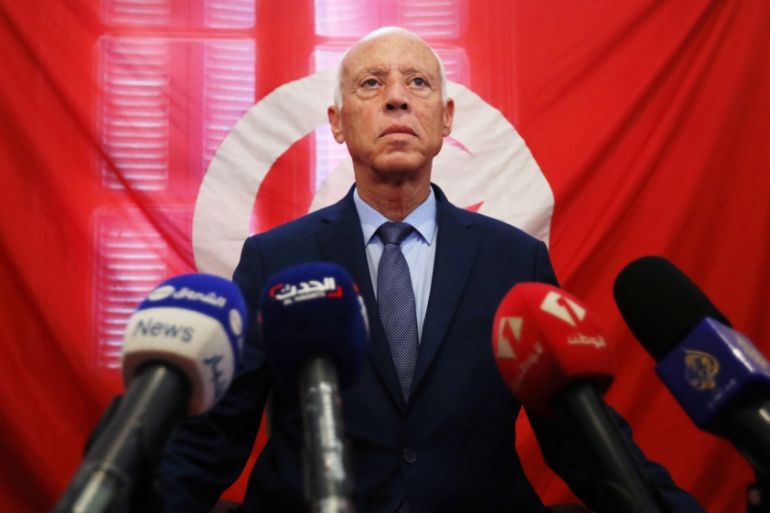Tunisia presidential hopeful halts campaign for ‘ethical reasons’
Kais Saied says campaigning before runoff vote would have created unfair advantage over jailed opponent Nabil Karoui.

Presidential candidate Kais Saied says he has stopped campaigning before Tunisia‘s runoff vote as it would have created an unfair advantage over his jailed opponent, media magnate Nabil Karoui.
The independent academic cited “ethical reasons” for halting any active campaigning for the October 13 polls, Tunisian state news agency TAP reported on Saturday.
Keep reading
list of 4 itemsLawrence Wong set to take centre stage as Singapore’s new prime minister
Key takeaways as ex-Trump lawyer Michael Cohen testifies in New York trial
Will Israel’s war on Gaza sway South Africa’s election?
Saied said he wanted “to remove the ambiguity related to the lack of equal opportunities between the two candidates”.
Karoui has been imprisoned since August 23 on allegations of money laundering and tax evasion. His supporters claim he was jailed on the eve of the election for political reasons as he was leading the polls.
On Friday, interim President Mohamed Ennaceur said in a brief televised statement that the authorities needed to find “an honourable solution” to the issue.
“One of the two candidates who won the first round is in prison and does not have the freedom to campaign or speak to his voters,” he said. “We will continue to ask all officials to find an honourable solution that respects the judiciary to overcome the unusual and strange situation.”
Parliamentary polls
Meanwhile, the country is set to return to the ballot box on Sunday to elect a new parliament.
Roughly seven million voters are eligible to vote in the elections, the second since Tunisia’s adoption of a new constitution in 2014 and the third since the 2011 uprising that toppled long-time ruler Zine El Abidine Ben Ali.
|
|
More than 15,000 candidates, running on more than 1,500 lists, are competing for 217 seats. But the high candidate turnout is not expected to be matched by voter engagement.
With the death of President Beji Caid Essebsi in July, the presidential polls were brought forward from November, sandwiching the October 6 legislative vote between two rounds.
“The majority of people are completely uninterested in the legislative elections,” said candidate Ghazi Mrabet.
In a first for Tunisia’s fledgeling democracy, debates were held between candidates before both the presidential and legislative elections, with the former drawing significantly more viewers.
But while voters may be more interested in who becomes head of state, it is parliament that is responsible for tackling the main issues preoccupying Tunisian society.
The rejection of the ruling political class in the September 15 presidential vote was rooted in frustration over a stagnant economy, high unemployment, failing public services and rising prices.
Observers expect voters will use the legislative polls to reinforce their choice of political outsiders in the presidential race.
A strong performance by Karoui’s Qalb Tounes party in the parliamentary elections could boost the media tycoon’s chances in the presidential runoff.
For his part, Saied has shunned the party system and offered no endorsements, leaving parties to court his diverse array of supporters.
Unpredictable vote
Compared with 2014, when the moderate Islamist party Ennahdha and the secular party Nidaa Tounes shared power, the outcome of these elections is unpredictable.
At least a third of the lists are independent, adding to the challenge of understanding a political landscape already fractured into a multitude of parties with few substantive differences.
“There is no clear polarisation, which is accentuating the lack of enthusiasm,” said Michael Ayari, Tunisia analyst with the Crisis Group.
Ennahdha’s credibility as a force for change has been damaged among its base for allying with political elites. It has since ruled out any possible alliance with Karoui’s party.
The main party in parliament with 69 seats, Ennahdha, may also lose votes to Karama, led by the populist lawyer Seifeddine Makhlouf. Karama has presented itself as an ally of Saied, who denies ties to the party.
Nidaa Tounes has splintered due to internal power struggles, with ex-members forming several new parties in recent months.
The publication of opinion polls is prohibited but according to informal surveys, independent lists could lead the polls.
The party that wins the most seats will have two months to form a government, which needs a majority of 109 votes. Preliminary results are expected on October 9.